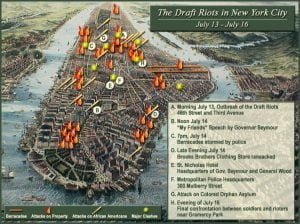Third Day of Draft Riots
Scenes in the City and at Head-quarters. Fight in Eighth Avenue. Cannon sweep the Streets. Narrow Escape of Captain Howell and Colonel Mott. Battle for Jackson’s Foundry. Howitzers clear the Street. State of Things shown by Telegraph Despatches. General Sandford sends out a Force against a Mob, at Corner of Twenty-ninth Street and Seventh Avenue. Colonel Gardin’s Fight with the Mob. Is Wounded. Mob Victorious. Dead and Wounded Soldiers left in the Street. Captain Putnam sent to bring them away. Disperses the Mob. Terrific Night. Tuesday had been a day of constant success to the police and military, and many … Read more

